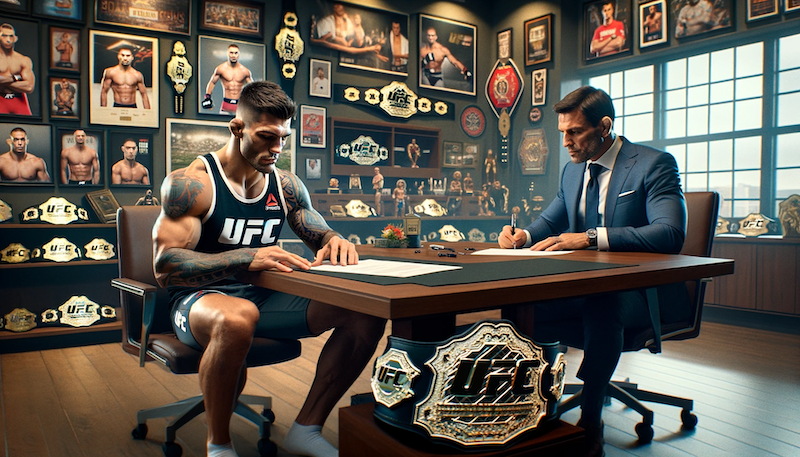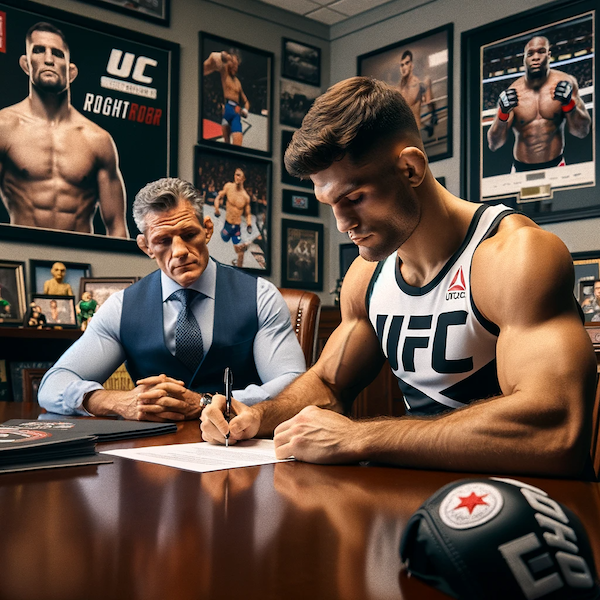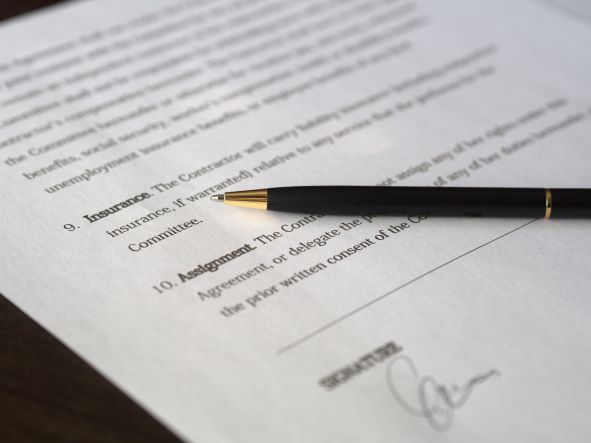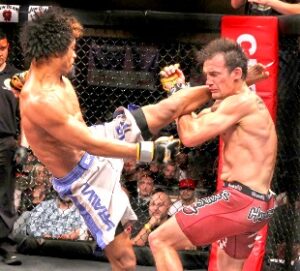
Are you wondering how UFC contracts work and whether they’re against fighters?
In this article, we’ll look at exactly how UFC contracts work and what they consist of both good and bad.
Contents
- How Do UFC Contracts Work?
- Are UFC Contracts Against Fighters (Restrictive, Controlling, or One-sided)?
- 1. Fighters Are Independent Contractors but Treated Like Employees
- 2. Non-compete & Right To Match Clauses
- 3. Champion Clause
- 4. Multiple Contract Extension Clauses
- 5. Renegotiating UFC Contracts
- 6. Termination
- 7. UFC Controls Where an Athlete Fights
- 8. Fighters Can’t Discuss UFC Contracts
- 9. Fighters Can’t Use the UFC Title Without Permission
- 10. The UFC Can Use a Fighter’s Ancillary Rights
- Are UFC Contracts Good for Fighters?
- The Bottom Line
How Do UFC Contracts Work?
UFC contracts work by the UFC and the fighter agreeing to X amount of pay for X amount of fights and or X period of months.
UFC contracts can vary in length and are usually for 3 fights but can be up to 8. Fighters may also be contracted to a minimum amount of months rather than a specific amount of fights – it all depends on the negotiations between the UFC and the fighter.
UFC contracts must offer fighters a minimum of 3 fights per year, while fighters aren’t obliged to accept any fight.
UFC fighter pay is most often paid in 2 halves, to show and to win. Fighters earn show money by making weight and turning up at the event prepared to fight. Fighters don’t have to fight to earn show money, as in the event a fight is canceled at late notice, they still earn something.
Fighters with a bigger reputation and higher UFC ranking can negotiate flat fees for each fight, but this is a small percentage.
Also reserved for the bigger-name fighters are PPV points, as it’s often only champions who receive them. Challengers have at times received PPV points, but it’s at the UFC’s discretion.
Contracts also make fighters eligible to win ‘Of the Night’ bonuses, such as Fight of the Night and Performance of the Night – which each pays $50,000.
Along with the basics, UFC contracts stipulate that UFC fighters must adhere to the UFC Fighter Conduct Policy, which details how fighters are expected to act and conduct themselves, and how they aren’t.
In short, fighters shouldn’t do anything that negatively reflects on the UFC with their actions inside and outside of the cage. Fighters in breach of the UFC Fighter Conduct Policy can be sanctioned, suspended, or released.
Unsurprisingly, UFC contracts also stipulate that fighters must compete at all times to the best of their ability and must be open with the UFC about anything that could prevent this.
UFC Bout Agreements
After fighters have signed a UFC contract, they also have to sign bout agreements before each fight. Pre-fight bout agreements look at:
- Proposed fighters
- Fight target date
- Event location
- Weight division and the potential sanctions for missing weight
- Show and win pay or flat fees
Although fighters have already signed contracts agreeing to show and win pay for so many bouts, as independent contractors they can try to renegotiate payment for each fight, which includes the possibility of earning a flat fee.
Renegotiating for a higher show and win payment during bout agreements is more likely to be granted if a fighter is winning many fights, or if they’re stepping in as a late-notice replacement to save a potential fight.
The UFC is willing to pay more to fighters who can save a fight and potentially a card – as obviously, having to cancel an event is much worse for the UFC than paying some extra money. They’ll also never cut a fighter who loses a short-notice fight.
Are UFC Contracts Against Fighters (Restrictive, Controlling, or One-sided)?

There’s been a tonne of talk about whether UFC fighters are underpaid, and certain elements of a UFC contract are a big reason why.
There are several clauses and terms and conditions that make UFC contracts against fighters by being restrictive, controlling, and not beneficial to fighters – but rather one-sided in favor of the UFC.
Information about UFC contracts first became available in 2013 when Bellator sued former UFC champion Eddie Alvarez, and his former UFC contract was made public as part of the trial.
More information about UFC contracts was made public because of a 2014 antitrust lawsuit against the UFC by six former fighters, which is now a class action lawsuit still ongoing into 2023.
UFC contracts may be considered restrictive, controlling, and one-sided for the following reasons:
1. Fighters Are Independent Contractors but Treated Like Employees
UFC contracts see fighters as independent contractors but treat them like employees.
Fighters have to wear Venum apparel when fighting and throughout fight week, as per the UFC’s athlete outfitting policy.
This started in 2014 when the UFC signed an apparel deal with Reebok, which meant fighters could no longer receive sponsorship money by having sponsors on their clothing or by having a sponsored banner in the octagon before a fight.
Fighters lost money as a result and are being treated like employees who must wear a uniform.
UFC contracts also make fighters participate in USADA’s anti-doping program, which requires fighters to tell USADA where they are when asked and also be available for drug testing at random times. If fighters fail with either they can be suspended or released.
Also, as independent contractors, UFC fighters have no right to form a union, which would fight for fighters’ rights and could negotiate better pay and terms for them. This keeps fighters isolated and fighting for themselves.
If injured and unable to fight, fighters aren’t entitled to ‘injured on Duty’ payments and won’t earn money until they’re able to fight again – which could be months or even years.
If released by the UFC, fighters aren’t entitled to unemployment benefits – which they would be if they were employees.
Overall, the UFC avoids paying UFC fighters like employees and the extra tax they’d have to pay, all the while enforcing rules on fighters and having them miss out on the various benefits they’d get as employees.
2. Non-compete & Right To Match Clauses
UFC Contracts often include non-compete clauses preventing a fighter from signing with another promotion for a certain time (usually 1 year) after they’ve fought the last fight on their contract.
This is known as the ‘matching period’ and it gives the UFC time to try and renegotiate a new contract with the fighter. It goes hand in hand with their ‘right to match’ clause. This clause allows the UFC to know about a fighter’s offers and gives them the ability to match them.
Fighters don’t have to accept the new offers from the UFC (obviously), but they’re restrictive and prying in nature.
Most notably, Nate Diaz made it clear he wanted to leave the UFC and ply his trade elsewhere, but he still had fights left on his UFC contract that he had to fulfill.
3. Champion Clause
The champion clause in a UFC contract extends a champion’s contract an extra year or 3 fights (as negotiated) as long as they remain the champion. This keeps a UFC champion tied to the UFC and unable to test the free market.
The champion clause is keeping current heavyweight champion Francis Ngannou tied to the UFC in the current stalemate.
The UFC has exercised the champion clause and negotiations for his next contract have stalled as Ngannou feels he’s not being offered champion status money. Ngannou’s final fight on his last contract was against Cyril Gane in January 2022.
Both sides are negotiating payment but Ngannou also wants more freedom in his new UFC contract and wants to renegotiate on a per-fight basis, rather than being tied in for too many fights or months.
Francis Ngannou has been rumored to want a boxing match with Tyson Fury, but the champion and non-compete clauses in his UFC contract are preventing him from competing outside of the UFC.
As per the champion clause, Ngannou will become a free agent in January 2023, 1 year after his last fight.
4. Multiple Contract Extension Clauses
Alongside non-compete and champion clauses, the UFC can also extend a fighter’s contract if a fighter declines a fight or is injured, disabled, sick, incarcerated, and suspended or revoked by an Athletic Commission.
The extension is usually 6 months but it depends on the contract.
They can use this 6 months contract extension almost at will and have done so after fighters have declined extremely unfavorable fights, such as fights only a month or two after their last fight, leaving the fighter without enough time to prepare.
Also, if a fighter declines a fight, the UFC is under no obligation to offer them another fight right away, meaning a fighter can be left without a fight for months. The UFC only has to offer 3 fights a year.
In terms of injury, the UFC can extend a fighter’s contract by the period of recovery from injury or disability, or for a time of 6 months. So if a fighter has a 48-month contract and they’re injured for 12 months, their contract essentially becomes 60 months.
If a fighter decides to retire, it must be from all fighting, and the UFC can suspend the contract. If a fighter comes back out of retirement, they’re still contracted to the UFC and have to finish the remaining months or fights on their contract.
Written into a UFC contract is also the UFC’s right to have a fighter’s claimed injury examined by a doctor of their choosing, for which the fighter has 1 day’s notice.
This means fighters can’t fake injuries to avoid fights and contracts can’t be finished by being injured and unable to fight.
5. Renegotiating UFC Contracts
Although not written into a contract, if the UFC is renegotiating a contract with a fighter and the fighter is asking for more money because they’re performing well and feel they’re worth more, the UFC will always try to extend a contract length as a way to keep the fighter locked in; albeit at a higher base pay than the fighter is currently on.
For example, a fighter signed a contract in 2020 for 6 fights and has had 4 fights and won all 4, and now wants to renegotiate.
The UFC will never give them a higher show and win pay for just the next 2 fights. They offer an improved amount for another 6 fights and or a period of months.
Locking a fighter in for a long time can only benefit the UFC, seeing as they can cut a fighter more or less whenever they please (discussed below).
6. Termination
Written in UFC contracts is the UFC’s right to terminate a contract and release a fighter. Reasons include:
- A fighter is unable to fulfill the minimum number of bouts they signed for, no matter the reason (excluding injury) – maybe a fighter is continually declining fights
- Anything a fighter claimed during the contract negotiations turns out to be false
- A fighter is suspended or has their license revoked by a State Athletic Commission
- A fighter is charged with a felony or misdemeanor (excluding minor driving offenses)
- A fighter is unable to obtain a visa to make a fight
- A fighter loses a fight or isn’t declared the winner (draws, no-contests)
The UFC has the right to release a fighter if they didn’t win their fight, which is usually exercised after a fighter loses 3 fights in a row. However, it can happen after just 1 loss if the UFC feels a fighter doesn’t have a future with them.
7. UFC Controls Where an Athlete Fights
UFC fighters aren’t allowed to fight with other promotions as the contracts are considered exclusive, but if the UFC can’t offer them a fight for whatever reason, they can offer fighters the chance to fight for another promotion (co-promotion).
This has happened in the past with UFC fighters having some fights in Pride FC, but it’s not common practice. It counts as one of a fighter’s contracted fights and the payment will either be paid by the UFC or by the promotion they’re fighting for, as negotiated.
If a fighter wants to fight outside of the UFC, they have to seek permission from the UFC. The UFC will only accept a fighter fighting outside if it benefits them.
This was the case with Conor McGregor when he fought Floyd Mayweather in a 2017 boxing match. McGregor was still under a UFC contract, which meant the UFC had to co-sign with McGregor as a partner for the fight and also file for co-promotion with Mayweather’s team.
Without permission, fighters can only compete in UFC fights and it’s also illegal for them to talk to outside promotions without first consulting the UFC.
8. Fighters Can’t Discuss UFC Contracts
One of the reasons UFC fighter pay is spoken of so much is that fighters aren’t allowed to discuss the details of their UFC contract unless required by law. This includes clauses, payments, and anything else they may have in their contract.
If fighters discuss parts of their contract openly, they’re liable to suing by the UFC.
Information about UFC contracts came about because of the lawsuits against the UFC, as well as State Athletic Commissions which were once required by law to report a fighter’s base pay.
Now though, State Athletic Commissions are moving toward having combat sports pay undisclosed.
In 2020, the NSAC (Nevada) made MMA and boxing purses confidential under a new confidentiality agreement and have since been joined by Florida and Arizona.
The FSAC made purses confidential because the UFC deemed fighter pay a trade secret, which likely has something to do with the class action lawsuit.
9. Fighters Can’t Use the UFC Title Without Permission
Ex and current UFC fighters can’t use UFC titles and other names or logos to describe themself, or in advertising or promotional work, as per Zuffa’s intellectual property rights. The same applies to fighters concerning all UFC sponsors.
In order to use UFC terms and logos, fighters must write to the UFC and receive written permission. The UFC can change their minds at any time.
This means a fighter could give a decade of their time to the UFC, and one disagreement with the UFC could mean the fighter isn’t able to associate themselves with the UFC anymore.
10. The UFC Can Use a Fighter’s Ancillary Rights
UFC contracts stipulate that the UFC can use everything relating to a fighter (ancillary rights) and people associated with them (team members) for promotion, advertising, and marketing of the UFC brand and events at all times; even after a fighter has retired or died.
The UFC may use a fighter’s:
- Image
- Voice
- Signature
- Names and nicknames
- Life events (used for storytelling)
Upon signing a UFC contract, a fighter grants the UFC their ancillary rights, which is essential for the UFC to promote current events and build future content for UFC Fight Pass.
Fighters may deem this intrusive but it’s required when signing a contract. The main problem is that fighters aren’t paid when the UFC continues to use their ancillary rights after retirement – which many feel they should be.
However, fighters do receive some compensation as per the ancillary rights agreement when their names and images are used on various products. The best example is the UFC game developed by EA Sports, where fighters included in the game are given an undisclosed fee.
Are UFC Contracts Good for Fighters?

After going through how UFC contracts can be restrictive and controlling, let’s take a look at the positive aspects of UFC contracts for fighters.
1. Accidental Health Insurance
In 2011, the UFC became the first MMA promotion to provide each fighter with full accidental health insurance to cover training and fight-related injuries up to $50,000 per year.
The insurance also covers non-training incidents such as road traffic injuries and covers fighters worldwide 24/7.
2. Incidentals
UFC contracts also feature some minor perks for fighters such as:
- For non-title fights, the UFC provides 1 hotel room and 2 return economy flight tickets for a fighter and 1 team member from airports of their choosing, up to 8 days before the bout date.
- For title fights, the UFC provides 2 hotel rooms and 3 return economy flight tickets for a fighter and 2 team members from airports of their choosing, up to 8 days before the bout date.
- A fighter and 1 team member are given $50 each per day for food and drink
3. Merchandise Rights Agreement
Along with the ancillary rights agreement mentioned above, UFC fighters receive 10% per the merchandise rights agreement of their contract for all merchandise sales involving a particular fighter’s name and likeness.
This includes sales of toys, cards, clothing, and equipment.
It could be argued that 10% isn’t enough, but they’re earning the money passively and 10% of UFC sales is much higher than merchandise sales from any other MMA promotion.
The Bottom Line
So, how do UFC contracts work?
UFC contracts work by securing a fighter’s services for X number of fights or months for X amount of show pay and win pay.
UFC contracts include eligibility for win bonuses, how the UFC must offer them 3 fights per year, how fighters must follow the UFC Fighter Conduct Policy, and how fighters must fight to the best of their ability at all times.
UFC contracts also include some positives for UFC fighters such as accidental health insurance, incidentals, and the merchandise rights agreement which sees them receive compensation on sales involving their name or likeness.
What they also include though, are clauses and terms and conditions which many consider restrictive and controlling of fighters and one-sided in favor of the UFC.
Fighters are tied to the UFC despite wanting to leave, are treated like employees despite being independent contractors, and can also be cut for many small reasons – as just a few examples.
The only way UFC contracts will become more mutually beneficial is if the UFC is made to change via the class action lawsuit, as currently, the UFC has a monopsony and effectively controls the market.




